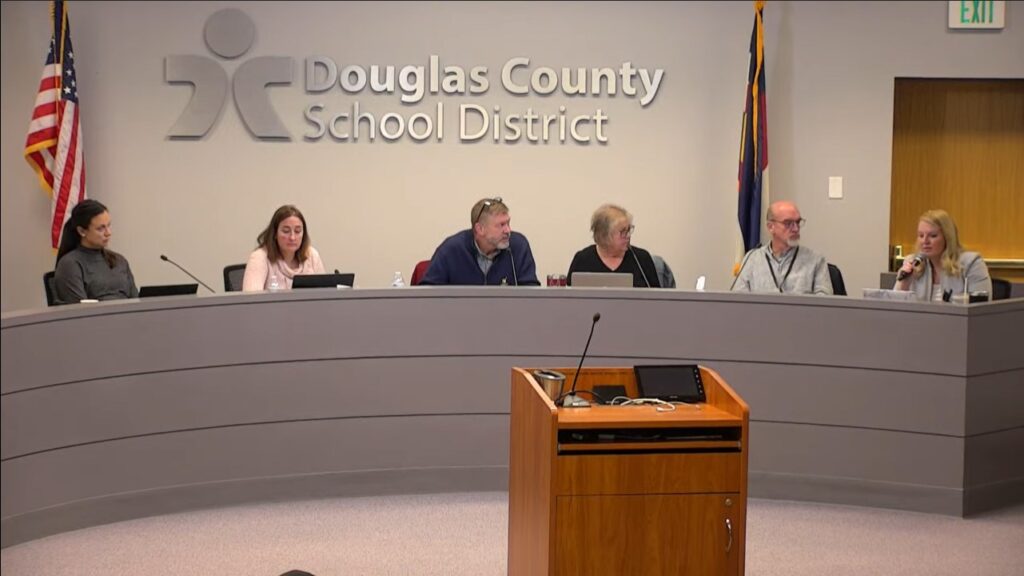By Jeffrey A. Roberts
CFOIC Executive Director
The Douglas County School District must let 9NEWS anchor Kyle Clark see a Colorado Open Records Act request that sought the names of teachers who called in sick Feb. 3 to protest actions by majority members of the school board, a judge ruled Thursday.
The district claimed the CORA request is not a public record because it had been withdrawn by the requester.
But Douglas County District Court Judge Jeffrey Holmes wrote, “There is no authority of which this court is aware that permits a requester to remove a CORA request from its status as a public record by simply asking that it be withdrawn.”

“This is especially true when, as here, a CORA request is made for an Original Request prior to any effort at withdrawal and the Original Request clearly remained a public document seeking and triggering government action,” Holmes added.
The judge’s order says Clark must be allowed to inspect the CORA request, “including the name of the requester.”
Clark, who sued the school district last month along with the company that owns 9NEWS, was one of several journalists and members of the public who asked for copies of the CORA request for the teachers’ names, according to an online log published by the district.
Steve Zansberg, the attorney for Clark and TEGNA, argued for disclosure of the CORA request in court filings and during a hearing last Friday. The law’s definition of “public records,” he pointed out, includes any “writing” that is “made, maintained or kept” by a political subdivision of the state (such as a school district) “for use in the exercise of functions required or authorized by law or administrative rule.”
In this case, the school district quoted the CORA request (without the requester’s name) in a Feb. 15 email sent to more than 1,500 teachers and other staff members who asked to be absent from work on Feb. 3, the day of a rally at district headquarters. The next evening, on Feb. 16, the school board used the CORA request to set the agenda for an executive session, after which the board president announced that the teachers’ names would not be released.
The CORA request “does not suddenly become not a public record after it’s been used in the exercise of public functions,” Zansberg said in court. “… It was, and is, and will forever be a public record.”
The judge agreed. “Clearly the Original Request was maintained at the time of Clark’s request,” Holmes wrote. “School employees had been advised of both its contents and of (the school district’s) intention to respond to it. The Original Request was also the subject of a school board meeting.”
Zansberg, who is president of the Colorado Freedom of Information Coalition, also contended the person making the CORA request had no reasonable expectation of privacy. Before submitting a form on the school district’s website, that person would have seen a notice — in red, uppercase letters — that “as of January 1, 2022, we will no longer redact names of the persons that submit CORA requests.”
“It’s hard to see how the person submitting the request, at the time they did so, had any reasonable expectation that their name would not be disclosed,” Zansberg said.
Andrew Ringel, the lawyer for school district records manager Ioana Marin, argued during the court hearing that a CORA requester does have a privacy interest, especially now that “we live in a time when people get doxxed.” He said the notice on the school district’s website doesn’t mention withdrawn CORA requests, and it’s been the district’s practice to not include withdrawn requests on their publicly available CORA logs.
The judge noted that, in certain circumstances, CORA permits an individual to request that their address on a public record not be disclosed, “but the court is unaware of any similar authority that permits a person to request that their name on a public record be kept confidential.” The legislature, he added, “could have provided for the non-disclosure of names, in addition to addresses, if it determined it was appropriate to do so.”
The record requested by Clark should have been provided right away, Zansberg also contended in court filings, because it was “readily available” at the time Clark submitted his CORA via an online school district form on Feb. 15. Under CORA, the date and hour set for inspection of records is supposed to be within three working days — but that’s for records that aren’t “readily available.”
Marin didn’t acknowledge receiving Clark’s request until Feb. 18. Four days later, on Feb. 22, she asserted that “extenuating circumstances” required more time to respond. “Please be advised that we cannot reasonably prepare the records requested within the three-day period without substantially interfering with our obligation to perform our other public responsibilities,” Marin wrote, according to the brief filed by Ringel.
But CORA’s “extenuating circumstances” provision — which lets records custodians expand the response deadline to 10 working days — does not apply to “a single, specifically identified document.”
CORA requests and other public demands for the names of Douglas County educators and staff who took sick leave Feb. 3 prompted state lawmakers to introduce a bill this session that bars the disclosure of information showing the specific date of a teacher’s absence from work. The anti-doxxing legislation, which passed the House and was sent to Gov. Jared Polis last week, amends CORA’s definition of non-disclosable personnel file information.
The measure, if it becomes law, will counter a 2016 Colorado Court of Appeals ruling that records showing a public school teacher’s sick leave are not part of their confidential personnel file and must be disclosed.
Follow the Colorado Freedom of Information Coalition on Twitter @CoFOIC. Like CFOIC’s Facebook page. Do you appreciate the information and resources provided by CFOIC? Please consider making a tax-deductible donation.




